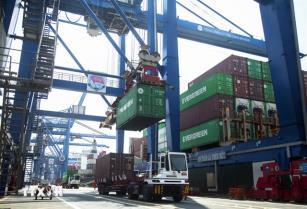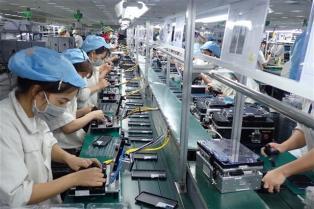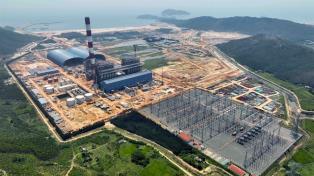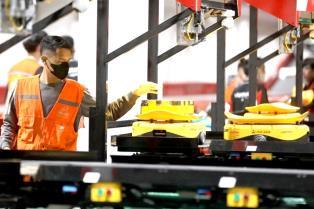Việt Nam News reporter Thu Ngân spoke with Associate Professor Dr Vũ Hải Quân, former chancellor of Vietnam National University HCM City, and Ngô Thị Ngọc Lan, regional director of Navigos Search Hà Nội, to assess the current state of personnel in science, technology, innovation, and digital transformation.
Việt Nam stands on the brink of a historic turning point, with science, technology, innovation and digital transformation playing the central role. At the same time, advancements in human resources are expected to propel the country toward its long-term development goals. Việt Nam News reporter Thu Ngân spoke with Associate Professor Dr Vũ Hải Quân, former chancellor of Vietnam National University HCM City, and Ngô Thị Ngọc Lan, regional director of Navigos Search Hà Nội, to assess the current state of personnel in science, technology, innovation, and digital transformation.
Associate Professor Dr Vũ Hải Quân, former chancellor of Việt Nam National University Hồ Chí Minh City:

In recent years, Việt Nam's human resources in the fields of science, technology and innovation have made significant strides -- particularly young professionals who have received comprehensive training both at home and abroad. Many individuals have been able to participate in regional R&D projects, start entrepreneurial ventures in innovation, and engage in international collaborations.
However, compared to the demands of global scientific, technological, and innovation advancements, our workforce still requires further development in research capabilities, adapting to international environments, and commercialising research outcomes.
For foreign investors, Việt Nam offers the advantage of being dynamic, quick to adapt and eager to learn. However, there is a need to improve language skills, creative thinking and technology management abilities in a cohesive manner to better meet integration requirements.
Việt Nam has a young workforce, a high proportion of the population in the working-age group, and a continuously improving education system.
The tradition of diligence, the quick adoption of new technologies and a strong spirit of entrepreneurship are notable advantages.
The higher education system is increasingly enhancing international cooperation. Various advanced training programmes, high-quality initiatives and links with prestigious universities worldwide have been organised.
Besides that, the State's strategic orientation on science, technology, and innovation, reflected through resolutions and national programmes, has created a favourable environment for training and developing high-quality personnel.
Take Vietnam National University Hồ Chí Minh City (VNUHCM) as an example: domestic and foreign businesses alike highly value its graduates for their in-depth professional knowledge, self-learning ability, sense of responsibility, professional demeanour, and innovative thinking. The employment rate of graduates within 12 months after graduation always exceeds 90 per cent.
Many graduates have become personnel in leading technology corporations, as well as reputable research organisations at home and abroad. The community of businesses also positively acknowledges the language skills, soft skills, problem-solving abilities, and adaptability to global working environments of VNUHCM students.
To continue to attract and retain talent in sci-tech development and innovation, there needs to be comprehensive government involvement with practical solutions.
Firstly, by establishing a competitive and transparent remuneration mechanism, including salary policies, bonuses and research allowances commensurate with the qualifications and contributions of scientists along with a professional, fair work environment.
Also, there is a need for substantial investment in modern research infrastructure such as key laboratories and national innovation hubs to maximise the capabilities of scientists.
Similarly, strong support mechanisms for R&D activities and innovation startups through venture capital funds, the national science and technology development fund and policies to encourage commercialisation of research results are necessary.
Expanding policies to attract international experts is equally critical, including streamlining visa and residence procedures, offering tax incentives and benefits to attract foreign talent, and encouraging Vietnamese intellectuals abroad to contribute to the country's development.
Equally important is fostering a strong partnership between research institutes, universities, businesses and the Government to create innovative ecosystems. These ecosystems would provide talent with comprehensive access to everything from training and research to production and the market, thereby generating sustainable incentives for long-term commitment and contributions.
Ngô Thị Ngọc Lan, regional director of Navigos Search Hà Nội:

In the context of the rapidly developing digital economy, Việt Nam's demand for skilled human resources in science, technology and innovation is growing, particularly in high-tech industries.
According to data from the General Statistics Office, in 2025, the engineering, technology, construction, architecture, and fine arts sectors are expected to comprise approximately 34 per cent of the total employed workforce.
Companies are currently seeking specialists with deep expertise in areas such as AI, big data, cybersecurity, software development and automation to keep pace with the rapid growth of the economy.
Domestic companies and international investors are turning their attention to Việt Nam in search of cooperation and development opportunities.
At the same time, Government policies, strategies and private sector investments strongly boost innovation, increasing the demand for high-quality human resources in other sectors such as e-commerce, manufacturing, and renewable energy.
Furthermore, the rising influx of foreign investment, particularly from large technology corporations, is creating a growing demand for specialised experts supporting international business operations and research and development activities.
As a result, the demand for skilled labour in STEM fields and advanced technologies such as AI, machine learning, robotics and blockchain is also rising rapidly and visibly.
Although Việt Nam is still in the golden demographic structure phase with many young people, this presents a significant opportunity for economic growth. However, the quality of the workforce in these fields still faces many challenges.
While many universities and educational institutions in technical and technological fields steadily improve the quality of training and expand their curricula, especially in STEM programmes, there remains a gap between the skills being taught and the actual demand in the technology industry.
In reality, many graduates in Việt Nam still lack practical experience and have not reached the high professional standards required in fields like AI, data science and software engineering.
Additionally, the shortage of highly qualified researchers and R&D specialists has been, and will continue to be, a challenge to the innovation capacity of domestic companies. To bridge this gap, local organisations and businesses are strengthening cooperation with international partners and leading global universities, providing opportunities for students to access international learning environments, and enhance their skills in emerging technologies.
However, developing high-skilled human resources is one of the Government's top priorities. The Government has made progress in addressing these gaps by investing in higher education, encouraging public-private partnerships, and creating innovation centres.
Over time, these initiatives are expected to help bridge the skills gap and better align the high-skilled workforce with the needs of industry.
Việt Nam has several advantages with respect to training a high-quality workforce that meets the demands for the development of science and technology.
First is the golden demographic structure with a young and growing labour force. Việt Nam has a relatively young population, with 67.4 per cent of its people being between the ages of 15 and 64. This demographic advantage provides a large, adaptable labour force that serves as a driving force for economic growth.
Second is the government support and policies. The Vietnamese Government has been actively investing in STEM education, providing scholarships, improving and introducing new university curricula, and boosting international cooperation.
Its push for new initiatives has contributed to the development of the workforce in line with future technological trends.
Besides that, over the years Việt Nam has built a solid foundation in technical education by establishing top institutions such as the University of Đà Nẵng, Hà Nội University of Science and Technology, and HCM City University of Technology.
Last but not least is an emerging innovation ecosystem. Việt Nam's technology startup ecosystem is thriving, with numerous initiatives by young entrepreneurs in fields like AI, fintech and e-commerce.
The increasing number of incubators and accelerators is nurturing and developing innovative projects while training skilled experts and technologists.
To attract and retain talent in the fields of science, technology and innovation, the government should consider investing in high-quality education and training.
It should focus on modernising and expanding STEM curricula while ensuring universities provide practical skills aligned with innovation trends. Encouraging collaboration between universities, research institutes and industry will provide students with opportunities to learn, gain experience, and become candidates who meet employers' needs.
Other solutions include encouraging collaboration with domestic and international businesses, attracting more international talent and supporting innovation and incubation centres and startup ecosystems. VNS





